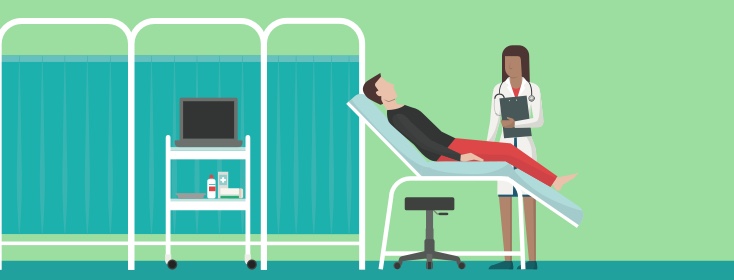What To Expect in The Emergency Room
I am a respiratory therapist. I am involved in the care of people with COPD, especially if you come to the emergency room feeling short of breath. So, I thought it would be neat to share with you what happens when you come to the emergency room for a COPD flare-up.
Assessing vital signs
This includes a blood pressure, pulse, respiratory rate, and pulse oximeter. The pulse oximeter will show your oxygen saturation, and indicate whether or not you need supplemental oxygen. If necessary, a nurse may hook you up to a nasal cannula. This alone can help you breathe easier.
This nurse is usually the one who sends a page out to me, saying something like, “You are needed in ER.”
A visit from a respiratory therapist
In most cases, I introduce myself: “Hi, I’m John from respiratory therapy.” I usually whip up a breathing treatment. I take an ampule of albuterol or Duoneb and pour it into a nebulizer cup. Depending on your preference, I attack either a mask or a mouthpiece to it. Then I give you the treatment.
Breathing treatments
And so I am well received. In a few instances, however, I do find that I have to explain what they do. And, of course, they are still well received once I say, “This is easy, and it might help you get your breath back.”
Sometimes this helps you get your breath back. However, there are times, if your flare-up is stubborn enough, that a doctor might recommend that I give you more than one treatment. It's a safe medicine, and it's okay to do this when you are surrounded by a good healthcare team.
Now, I could wait for the doctor to see you before I start your breathing treatment. But, because we want to get you feeling better as quickly as possible, I usually start the breathing treatment before the doctor comes to see you. This is necessary because doctors are busy, and because I have the medicine that you want and need.
Steroids for flare-ups
However, another medicine that is frequently ordered for COPD is systemic corticosteroids. This can be given by shot, or it can be injected into your veins via an IV. Corticosteroids help reduce inflammation in your airways to make your breathing easier. The thing is that it usually takes about an hour or so for the steroids to start working.
Of course, your nurse and doctor are also going to ask you questions and assess you to find out what exactly is causing your flare-up. The doctor will almost certainly order labs, meaning your blood will be drawn. It’s no fun, but this can give the doctor some valuable information to help properly diagnose and treat you. He will also almost certainly order a chest x-ray, and this also will help him properly diagnose and treat you.
Blood gas testing
This can also show if you are taking effective breaths to blow off carbon dioxide. If your carbon dioxide is high, or if your breathing is severe, a doctor might order for you to use a BiPAP machine.
Some of you may have one of these already at home, so I won’t need to explain it to you. For those who don’t, it entails putting a mask over your face. Pressures will then reduce the work you have to do to breathe to help you relax and breathe easier. I’m not saying you will need this, I’m just saying it’s an option to help you feel better until the medicine starts to take effect.
Determining cause of flare up
Once the doctor determines what is causing your flare-up, he may prescribe other medicines. For instance, if pneumonia is the culprit, he may start you on an antibiotic. If heart failure is the culprit, he may prescribe medicines to fix that.
Leaving the emergency room
Will you get to go home? Well, that depends on an assortment of things. I think the number one indicator of whether or not you get to go home is how quickly you sought help once you started feeling symptoms, or once your symptoms started feeling worse.
The general consensus of doctors and nurses that I have talked to is this: The sooner you seek help, the easier it is to fix you, and the greater the likelihood you will get to go home. Ideally, my initial treatment gets you feeling better. Chances are, however, that you will need something more than just that. This is just how COPD is.
But the good news is that modern medicine offers us many options for helping you to feel better. Sometimes we can fix you up quickly and you can go home. However, sometimes you may need to be admitted to the hospital so doctors can continue to work their magic to get you feeling better so you can get on with your life.

Join the conversation